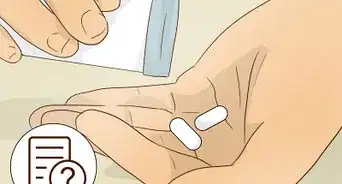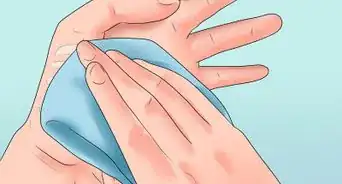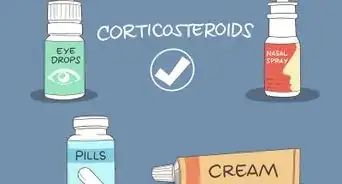This article was co-authored by Joshua Ellenhorn, MD. Joshua Ellenhorn, MD, is a board certified surgeon with advanced training in the fields of surgical oncology, minimally invasive surgery, and robotic surgery. He runs a private practice at Cedars-Sinai Medical Center in Los Angeles, California and is a nationally recognized leader in surgery, cancer research, and surgical education. Dr. Ellenhorn has trained more than 60 surgical oncologists and has spent over 18 years in practice at the City of Hope National Medical Center, where he was a professor and the chief of the Division of General and Oncologic Surgery. Dr. Ellenhorn performs the following surgical procedures: gallbladder surgery, hernia repair, colorectal cancer, skin cancer and melanoma, gastric cancer, and pancreatic cancer. He earned an MD from the Boston University School of Medicine, completed fellowships at the University of Chicago and Memorial Sloan-Kettering Cancer Center and finished his residency in surgery at the University of Cincinnati.
There are 11 references cited in this article, which can be found at the bottom of the page.
This article has been viewed 19,508 times.
You can speed up your healing process after surgery by keeping your body strong before and after your operation. Rest, healthy eating, moderate exercise, and a positive outlook are great ways to get better soon. Always follow your doctor's instructions carefully to avoid complications that might slow down the process![1]
Steps
Recovering After Surgery
-
1Rest for the first few days after your operation. It is normal to feel extremely tired following a surgery, especially if you had a major operation or a general anesthetic. Spend time in bed and do only as much as you feel up to doing during these first few days. Pushing yourself too early may be detrimental to your recovery.[2]
- Avoid any heavy lifting or rigorous exercise during this time.
- Ask your doctor how long you should rest right after your surgery. This will vary depending on the type of procedure.
-
2Move around as soon as you can, with your doctor's permission. As a general rule, it is important to get your body moving as much as possible once you start recovering from surgery. Movement will encourage blood flow and strengthen your muscles, making it easier for your body to heal.[3] Ask your doctor how much you are allowed to exercise while you recover and what activities you should avoid.[4]
- Moderate walking is usually the best exercise to begin with while you are healing.
- If you spend time recovering in a hospital, asking a nurse or orderly for help walking if necessary.
- If you are not yet steady on your feet, you may benefit from using a walker or cane to help you keep your balance.
Advertisement -
3Avoid strenuous activity while you heal. High-impact sports, heavy lifting, and rigorous exercise can all cause strain to your body that may delay your healing after surgery. Listen to your doctor's instructions about recovery time and restricted activities. Depending on the surgery you have, you may have to avoid strenuous activity for several weeks or months until your body is fully healed.[5]
-
4Follow your doctor's diet recommendations to avoid complications. With major surgeries, your doctor will generally provide you with a specific diet to follow after your operation. Follow any directions or meal plans your doctor gives you very closely while you heal.[6] Eating foods or ingredients that irritate your stomach or cause swelling may hinder your recovery. [7]
- Processed foods are likely to cause inflammation and stomach irritation.
- Foods like fatty fish, walnuts, almonds, flax seeds, leafy green vegetables, and turmeric can help reduce inflammation in your body.
- Many post-surgery diets are high in fiber to prevent constipation, which can cause you to strain and in turn hurt the site of your surgical wound.
- Lean protein like chicken or fish will help repair body tissue and boost your energy after surgery.
Taking Care of Your Wound
-
1Keep the wound dry for the first 24 hours after surgery. Avoid showering or bathing for a full 24 hours after your operation. If necessary, clean yourself with a sponge bath instead to avoid getting your incision site wet. For minor surgeries, it may be possible to clean the wound with soap and water 2 days after surgery.[8]
- Ask your doctor for more specific guidelines about cleaning your incision site, which will depend on what operation you had.
-
2Ask your doctor when you should remove your bandage. The size and location of your surgical wound will determine how long you should keep it covered. As a general rule, most surgical bandages can be removed entirely after 3-5 days. Ask your doctor when you can safely stop bandaging your incision site and follow their directions.[9]
- In some cases, your bandage should be removed the day after surgery to allow the healing process to begin.
-
3Follow your doctor's directions for getting your stitches removed. Depending on the surgery and location of your wound, stitches should be removed anywhere from 3 days to 3 weeks after your operation. Make an appointment to have your stitches removed at this time. Do not attempt to remove your stitches on your own as this should always be done by your doctor.[10]
- If you have internal stitches, they will be absorbed by your body gradually and don’t need to be removed.
- Do not wait too long to have your stitches removed, which could impede healing.
Preparing for Surgery
-
1Lose weight if you are overweight to improve your body's resiliency.[11] Carrying extra body weight can put you at risk of health issues like heart failure, hypertension, pulmonary embolism and cardiovascular disease. These conditions can make it difficult for your body to heal properly after an operation. Check with your doctor to find out the best way to lose weight safely before your surgery.[12]
- The best way to lose weight safely is generally to cut out fatty and processed foods, create a healthy meal plan, and increase your weekly exercise if you are physically able to do so.
- Try moderate exercise like walking for 60—90 minutes, 3-5 days a week.
-
2Ask your doctor about taking supplements to boost your immune system. Certain vitamins, such as A, C, and E, can promote wound healing. Protein can also improve your body's recovery after injury. Talk to your doctor about taking supplements prior to your surgery to help your body heal quickly after your operation.[13]
- Ask your doctor if they can test you for any specific vitamin or protein deficiency and recommend a targeted plan for supplement-taking before your surgery.
- Supplements can be purchased in pharmacies, health food stores, or online.
-
3Quit smoking to help ensure the success of your surgery. Smoking can greatly increase your risk of experiencing breathing problems when under anesthesia.[14] It can also damage your organs and vascular system, slowing your body's healing process.[15] If you are a smoker, ask your doctor about staring a your smoking cessation program before your surgery, such as: [16]
- Nicotine replacement therapy, in either gum, patches, inhalers, sprays, or lozenges.
- Prescription medication to ease withdrawal symptoms (e.g. Zyban.)
- Behavioural therapy, which can help you develop strategies to quit smoking.
References
- ↑ https://www.ncbi.nlm.nih.gov/pmc/articles/PMC2729270/
- ↑ https://www.nhs.uk/conditions/having-surgery/recovery/
- ↑ Joshua Ellenhorn, MD. Board Certified General Surgeon & Surgical Oncologist. Expert Interview. 28 April 2019.
- ↑ https://www.nhs.uk/conditions/having-surgery/recovery/
- ↑ http://www.ouh.nhs.uk/patient-guide/leaflets/files/121206woundclosure.pdf
- ↑ Joshua Ellenhorn, MD. Board Certified General Surgeon & Surgical Oncologist. Expert Interview. 28 April 2019.
- ↑ http://www.theportlandclinic.com/wp-content/uploads/2014/05/nutritionalguidelines.10813.pdf
- ↑ https://familydoctor.org/caring-for-your-incision-after-surgery/
- ↑ https://familydoctor.org/caring-for-your-incision-after-surgery/
- ↑ https://familydoctor.org/caring-for-your-incision-after-surgery/
- ↑ Joshua Ellenhorn, MD. Board Certified General Surgeon & Surgical Oncologist. Expert Interview. 28 April 2019.
- ↑ https://www.hss.edu/playbook/5-reasons-to-consider-weight-loss-before-surgery/
- ↑ https://www.nutritionnews.abbott/nutrition-care/surgery-hospitalization/incision-healing-and-nutrition--how-to-help-surgical-wounds-heal/
- ↑ Joshua Ellenhorn, MD. Board Certified General Surgeon & Surgical Oncologist. Expert Interview. 28 April 2019.
- ↑ https://www.who.int/news/item/20-01-2020-smoking-greatly-increases-risk-of-complications-after-surgery
- ↑ https://www.ncbi.nlm.nih.gov/pmc/articles/PMC2563647/
- ↑ https://www.ncbi.nlm.nih.gov/pmc/articles/PMC2802370/
- ↑ https://www.ncbi.nlm.nih.gov/pmc/articles/PMC2802370/
About This Article
To heal quickly after surgery, make sure you rest for the first few days after your operation. The exact amount of time you should rest will depend on the type of surgery you had, so follow your doctor's instructions. With that said, it's also important that you start moving around as soon as you can (with your doctor's permission) since it will encourage blood flow and strengthen your muscles, making it easier to heal. Moderate walking is usually the best exercise to start with. Definitely avoid strenuous activities though, like high-impact sports, heavy lifting, or rigorous exercise, since it can actually delay healing. Make sure you follow whatever diet your doctor recommends for after your surgery since the foods you eat can impact how quickly you heal. For more expert healing tips, read the full article below!







































































Medical Disclaimer
The content of this article is not intended to be a substitute for professional medical advice, examination, diagnosis, or treatment. You should always contact your doctor or other qualified healthcare professional before starting, changing, or stopping any kind of health treatment.
Read More...